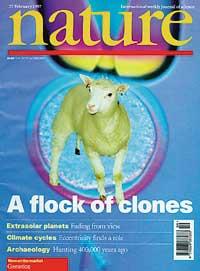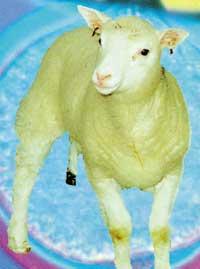II on science, technology, culture and society. Conference Days Days
1998/04/01 Urkizu, Urtzi Iturria: Elhuyar aldizkaria
EVANDRO AGAZZI, professor and philosopher of the University of Freiburg
At the conference entitled “Ethical Problems of Science and Technology”, the Italian philosopher spoke of the ethical doubts raised before the cloning. Agazzie considers that human cloning itself is not bad, but ethical problems may be due to the use of genetic manipulation. On the other hand, the philosopher does not see clearly the need to clone to human beings. In the case of animals, however, it has a favorable opinion, since it thinks it can become a “factory of drugs”.
In general, he says that in the discussion of cloning a basic fact is forgotten: that the natural clones we know for a long time, the monocygothic twins. However, even though twins grow in the same family and school, each wants and grows differently. According to Agazzie, the copies will never be the same and although the genetic heritage is cloned, this is only a part of the human being.
The media has exaggerated the debate of cloning with an excessive emotion. Surely within 15 years no one will be surprised and today there will be no reaction to human cloning. Likewise, the Italian researcher considers that the whole society should be involved in the elaboration of technical and scientific norms when projects can have negative consequences. Moral decisions must be made and every human being has his own responsibility for the benefit of society.
Professor and biologist of the UPV FELIX GOÑI
In his lecture entitled “Scientists before cloning”, Félix Goñi stressed that human cloning was absolutely impossible. He provided a personal vision of a biologist, once the clonic and transgenic organisms were clarified.
Research on cloning has not begun in this decade. The UPV/EHU professor provided significant data on: The history of the Dolly sheep goes back to time immemorial and in 1952 some experiments were carried out. In the 70's we also worked in this field, but until the 90's it has not been achieved with Dolly.
But Goñi does not see great success in this last achievement: 434 eggs from different sheep were taken first (many of them died on the way), of which 277 zigotos were obtained, of which only 29 embryos were executed; subsequently 21 fetuses were obtained, of which, after 20 abortions, the famous Dolly arose. Therefore, the success was one of the 434 and the original or mother of Dolly has long died. At the moment they have no intention of repeating this experiment.
Goñi recognizes, however, that transgenic clonic animals can be useful for the production of now unattainable medicinal products. But it would not make sense to clone man.
On the other hand, human cloning would be impossible because each human being is the result of interaction between genes and their environment. You can create a person with equal or almost equal genes, from there little. Therefore, the fantasies that are currently invented in some tertulias about cloning are false and impossible.
To finish, Felix Goñi posed the following question: Is biomedical research very expensive and worth spending so much money on these experiments?
JOSE M. MATO, biophysicist and hepatologist at the University of Navarra
“Confidentiality of genetic information” Jose Mª. Mato spoke of genetic research. The techniques of detecting genetic diseases are increasingly advanced, knowing some genes can detect the probability of suffering a disease.
Through the Genoma project, the knowledge of genes will be increasing in the coming years. We will have the opportunity to know what diseases we can suffer in the future, and how to cure them through prevention. But who should be the genetic information of a person? There arise a thousand problems. The conditions are different according to the public or private health system. In the US, for example, it is a private system and insurance companies want to obtain genetic information from their clients. This may involve the discriminatory use of genetic information.
Mato believes that each individual should have a protected human genome and for this purpose public health systems are the most appropriate. In the future genetic research will be very much covered, but we should know how to use the information obtained. Undoubtedly, the widest possible genetic information is positive and will improve the quality of life, but it will have to be protected.
VICTORIA CAMPS Professor of Ethics at the University of Barcelona
Victoria Camps put on the table many doubts in the conference “Ethics in the face of genetic manipulation”. He acknowledged that the non-scientists have little information and little time to inform us well about these issues. However, in the media, both cloning and the opinions that emerge are spoken of.
In the future, for example, there will be occasion to make children of “high quality”, and there human ethics has much to do. As research advances, we must see the uses. Genetic research is an important field, but one thing is to know the human genome and the other, the use of this knowledge.
Before the current ideological pluralism there are very different positions, often mixed. From an ethical point of view, do we have to talk about ethics or ethics? We have to be relativistic and each has its own ethics. For example, is it positive or negative to give a person their genetic information and say what diseases have possibilities? The answer is doubtful, especially if these diseases are incurable.
Victoria Camps works in bioethics with researchers from other regions. And there, the Catalan professor believes that science and humanity should go more united. Science is not neutral and these issues must be addressed in depth. Genetic information is positive and predictably valid in the future, but there is a risk of misuse.
Finally, Camps insists on the need to extreme caution with information given in the media and warns that we are not on the right track doing science fiction.
PASCUAL SEGURA Patent Expert
“Can genetically engineered organisms and genes be patented?” says Pascal Segura.
Through the slides, the expert of the University of Barcelona explained what a patent is and its advantages.
The media and some groups are fighting hard against patents because they are misinformed and do not know what patents are. Segura explained that patents are designed to promote technological development, to spread the new technology and facilitate research and development (R&D) of companies. Any invention can be patented, provided it is innovation and is not contrary to order and public morality.
As for gene patents, there is still no clear evolution. Scientist Craig Venter tried to patent part of a gene, but its use was not accepted because it was not clear. To patent something it is necessary to know its use. On the other hand, patents are public and are not secret. Patents, in addition, go by countries and can be recognized or not in each country.
Animals and transgenic plants are patenting and Segura believes this is only beneficial; she loves advertising patents. But when talking about man, things change and believe that the manipulated embryos could be out of patents. Patents are transparent and easy to control, but biotechnology is much more difficult to control and sometimes it is impossible to know what is done.
JOSE L. Professor at the University of the Balearic Islands LUJAN and Doctor by the CSIC
José Luis Luján presented at the conference “The public anecdote of genetic engineering and assisted fertilization” a sociological research, presenting the knowledge and opinion of society on science and technology. Luján acknowledges that these investigations are quite limited, especially because it does not say why people think what they think.
It is very difficult to know the opinion of people, since the way to ask questions can change the results. Society is more interested in the final product than moral values.
In a survey of 2,700 people, a number of issues related to science were raised, with a level of knowledge higher than expected, despite the scarce information available. When it came to opinions, more respondents accepted genetic manipulation with plants than with animals, and more with animals than with humans.
As for assisted fertilisation, most people see with good eyes this technique, but the data change if one is in that situation (20% less, they do not see it badly, but they would not). Asking for the adoption or assisted fertilisation, 50% would be in favor of each option. As for the genetic diagnosis, society is shown entirely in favor.
Lujane considers that there is little interest in these surveys and studies, but considers it important to know the vision of society. To conclude, a large majority of society noted that television is the main source of information on these issues.

Gai honi buruzko eduki gehiago
Elhuyarrek garatutako teknologia






